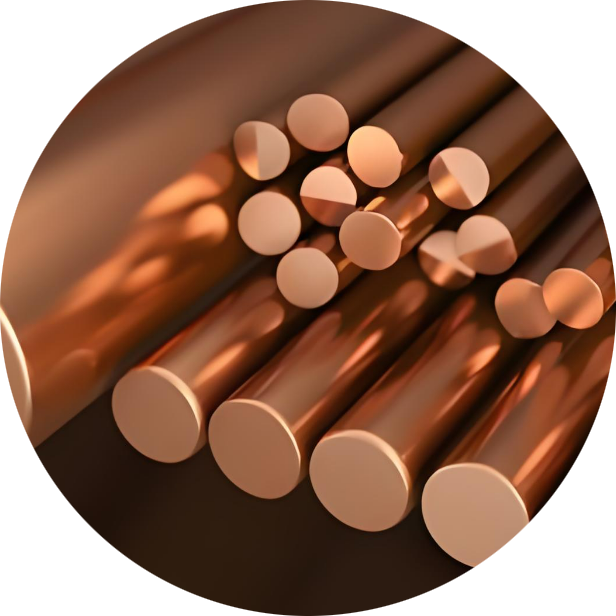Time to read: 6 min

When selecting materials for manufacturing projects, the subtle differences between brass, bronze, and copper can be confusing. This comprehensive guide examines the distinct properties, advantages, and applications of these three metals, providing clarity for designers and engineers in material selection.
Understanding Brass, Bronze, and Copper
Brass, bronze, and copper are金属材料 with a range of applications in various industries. Despite their similarities, they possess unique characteristics that make them suitable for specific uses.
Available Alloys
- Brass Alloys: Known for their versatility, with popular alloys including 260 (cartridge brass), 272 (yellow brass), 330 (high machinability), 353 (clock brass), and 360 (common grade).
- Bronze Alloys: Characterized by their copper and tin composition, with Alloy 932 (high-leaded bronze) and Alloy 954 (aluminum bronze) being common choices.
- Copper Alloys: Recognized for their conductivity, with Alloy 101 (oxygen-free copper), Alloy 110 (ETP copper), Alloy 122, and Alloy 145 (tellurium copper) being widely used.
Material Properties Differences
- Element Composition: Copper is a pure non-ferrous metal, brass is a copper-zinc alloy, and bronze is a copper-tin alloy.
- Corrosion Resistance: Bronze offers the highest resistance, followed by copper, with brass having the least.
- Durability: Bronze and copper are robust, while brass is more prone to splitting and cracking.
- Weight: Brass is the lightest, followed by bronze, with copper being the heaviest.
- Machinability: Copper has the highest machinability, bronze is moderate, and brass has a lower degree of machinability.
- Weldability: All three metals are weldable, with oxygen-free copper being the easiest to weld.
Conductivity Differences
- Electrical Conductivity: Copper has 100% conductivity, brass is 28% as conductive, and bronze has about 15% conductivity.
- Thermal Conductivity: Bronze has the highest thermal conductivity, followed by copper, with brass being the least thermally conductive.
Strength Differences
- Tensile Strength: Bronze has the highest tensile strength, followed by brass, and then copper.
- Yield Strength: Bronze also boasts a higher yield strength than brass and copper.
Formability and Melting Point
- Formability: Copper has exceptional formability, bronze alloys like PB1 phosphor bronze are also formable, while brass is harder to form.
- Melting Point: Bronze has the lowest melting point, making it more formable, followed by brass, with copper having the highest.
Appearance and Touch
- Color: Brass has a yellowish-gold color, bronze has a reddish-brown color, and copper's reddish-brown is very distinctive.
- Hardness: Bronze is the hardest, followed by brass, with copper being the softest.
Pricing & Options
- Cost: Copper is typically more expensive than brass and bronze, with brass being the most cost-effective due to its zinc content.
Applications of Brass, Bronze, and Copper
- Brass: Plumbing, electrical terminals, musical instruments, and decorative elements.
- Bronze: Marine components, electrical connectors, springs, and precision parts.
- Copper: Electric motors, telecommunications, heat exchangers, and architectural components.
Benefits of Brass, Bronze, and Copper
- Brass: Durability, anti-bacterial properties, and aesthetics.
- Bronze: Corrosion and fatigue resistance, dimensional precision, and high conductivity.
- Copper: High conductivity, excellent machinability, corrosion resistance, and recyclability.
Choosing Between Brass, Bronze, and Copper
Selecting the appropriate metal involves considering factors such as machinability, budget, and the intended application. Copper is ideal for electrical conductivity needs, bronze for its corrosion resistance in marine applications, and brass for its cost-effectiveness and decorative appeal.
Conclusion
The differences between brass, bronze, and copper are crucial for material selection in manufacturing. Each metal offers unique properties and benefits, making them suitable for distinct applications. Understanding these differences ensures the selection of the right material for your project's specific requirements.
Unofactory offers professional metal fabrication services with a focus on quality, cost-effectiveness, and fast lead times. Our expert technicians and machinists are ready to assist you in material selection and project execution, ensuring your metal parts and prototypes meet the highest standards.
For inquiries or to start your project with us, contact Unofactory today.




